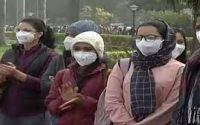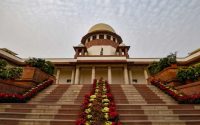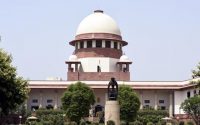Supreme Court sends Maratha quota matter to larger bench
Source:-hindustantimes
The three-judge bench order, which evoked sharp reactions from political leaders in Maharashtra, said admissions under the quota in post-graduate courses will remain unaltered. The matter will now be placed before Chief Justice of India, SA Bobde, for constitution of a larger bench.
The Supreme Court on Wednesday imposed an interim stay on quotas in jobs and education to Marathas and referred the matter to a larger bench that is likely to examine if the controversial 2018 law, which breached the 50% apex-court mandated cap in caste-based reservation, was legal.
The three-judge bench order, which evoked sharp reactions from political leaders in Maharashtra, said admissions under the quota in post-graduate courses will remain unaltered. The matter will now be placed before Chief Justice of India, SA Bobde, for constitution of a larger bench.
The decision came on petitions challenging the Maharashtra State Reservation for Socially and Educationally Backward Classes Act (SEBC Act) of 2018 that fulfilled a decades-old demand by the dominant community after a state government panel found the Marathas socially and economically backward.
The law originally provided 16% quota but in June 2019, the Bombay high court trimmed the quantum of the quota to 12% in education and 13% in jobs, as recommended by the State Backward Classes Commission. In its order, the high court upheld the legislation’s constitutional validity and said the 50% cap can be breached in exceptional circumstances, and if the quota was based on quantifiable data.
Soon after, petitioners moved the top court and contended that the law breached the 50% reservation threshold prescribed in the 1992 Indra Sawhney vs Union of India case. As that case was decided by a bench of nine judges, various parties sought reference of the case to a bench of 11 judges to conclusively settle the issue.
Senior counsel Mukul Rohatgi, appearing for Maharashtra, said, on August 26, that the case will have to be heard by a Constitution bench as it involved substantial legal questions relating to reservation threshold. Senior counsel Kapil Sibal, appearing for an applicant supporting the law, had also demanded an 11-judge bench.
“The matter has to go before a 11-judge bench. 50% criterion was evolved through judicial decision making. 85 percent (people) in Maharashtra belong to backward classes,” Sibal told the bench on August 26. He also submitted that reservation in 28 states exceed the 50% threshold after the Parliament introduced 10% reservation to Economically Weaker sections (EWS) by amending the Constitution in 2019.
In Maharashtra, many politicians said they were taken aback by the decision. Maharashtra minister Ashok Chavan said the decision was “unexpected and shocking”. The Bharatiya Janata Party (BJP) called it a “black day” for Marathas. “The MVA [Maha Vikas Aghadi] could not ensure the reservation held ground before the Supreme Court,” state BJP chief Chandrakant Patil told reporters.



